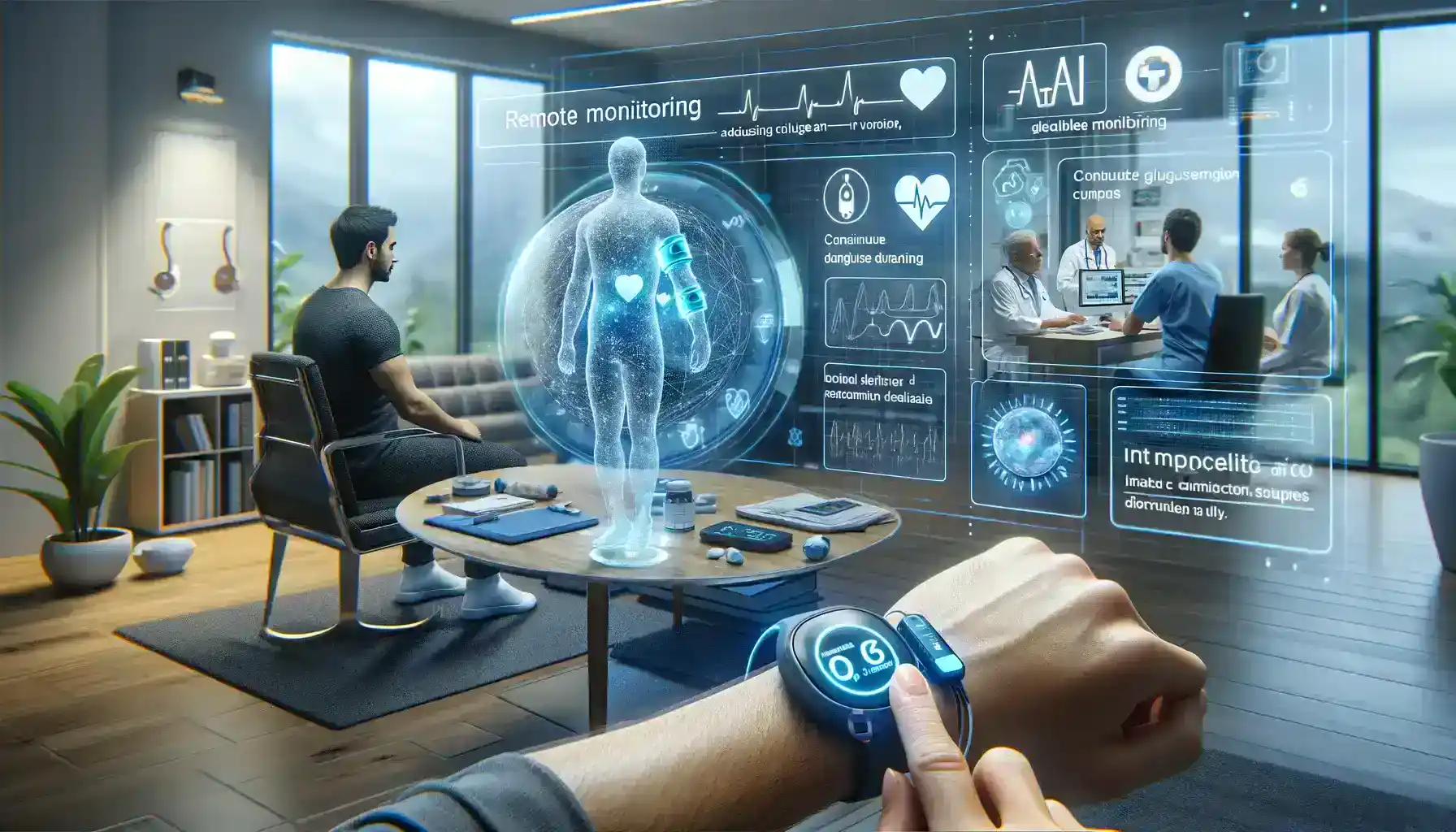Table of Contents
One of the primary ways CyberMed is revolutionizing healthcare is through the implementation of AI in diagnosis and treatment. Traditional diagnosis methods can be time-consuming and sometimes prone to errors. However, with the power of AI, CyberMed can analyze vast amounts of medical data quickly and accurately.
For instance, AI algorithms can process medical images, such as X-rays and MRIs, with a level of precision that surpasses human capabilities. This means that diseases and conditions can be detected at earlier stages, leading to more effective treatments and improved patient outcomes.

Furthermore, AI-driven predictive analytics play a crucial role in personalized medicine. By analyzing a patient’s genetic profile, medical history, and lifestyle factors, AI can assist healthcare providers in tailoring treatment plans that are uniquely suited to each individual.
This level of personalization not only increases the chances of successful treatment but also minimizes the risk of adverse effects, as medications and therapies are carefully chosen to align with the patient’s specific needs.
Enhanced Patient Experience with CyberMed
In the traditional healthcare model, patients often face challenges when accessing care or obtaining information about their health. This is where CyberMed shines in its patient-centric approach. AI-powered chatbots and virtual assistants are available 24/7 to answer patient queries, schedule appointments, and provide information about medications and treatment plans. This constant accessibility ensures that patients can receive support whenever they need it, leading to improved patient engagement and satisfaction.
Moreover, the integration of AI and telehealth services within CyberMed has made healthcare more accessible than ever before. Patients in remote or underserved areas can now connect with healthcare providers through video consultations, eliminating the barriers of distance. This not only expands the reach of healthcare services but also enhances the convenience for patients, who can receive medical advice from the comfort of their homes.
AI in Diagnosis and Treatment
AI technologies in CyberMed enable precise diagnoses and treatment plans. For instance, AI algorithms can analyze medical images more accurately than traditional methods, detecting anomalies like tumors earlier. Moreover, AI’s predictive analytics are instrumental in personalized medicine, tailoring treatments based on individual genetic profiles.
Unparalleled Diagnostic Accuracy
One of the most remarkable advancements within CyberMed is the ability of AI algorithms to analyze medical images with exceptional accuracy. This capability far surpasses traditional diagnostic methods.
For example, in the detection of anomalies like tumors, AI-driven image analysis proves to be a game-changer. Radiologists and healthcare providers can rely on AI to assist in identifying subtle abnormalities at earlier stages. This early detection not only increases the chances of successful treatment but also reduces the need for invasive procedures.
AI’s Predictive Analytics for Personalized Medicine:
Beyond diagnosis, AI within CyberMed plays a pivotal role in predictive analytics, ushering in the era of personalized medicine. By harnessing the power of AI, healthcare providers can delve deep into a patient’s genetic profile, medical history, and lifestyle factors. This wealth of information allows for the tailoring of treatment plans that are uniquely customized to each individual.
For instance, when treating a patient with a particular condition, AI can analyze the patient’s genetic markers to predict how they might respond to different treatment options. This enables healthcare providers to choose the most effective and well-tolerated treatments, minimizing the risk of adverse effects.
Moreover, AI-driven treatment plans can adapt over time as more data becomes available. This level of personalization ensures that patients receive not just treatment but treatment that is optimized for their specific needs, ultimately improving health outcomes.
Remote Monitoring and Telehealth
AI integrates with wearable technologies, allowing continuous monitoring of vital signs. This data is invaluable for managing chronic conditions like diabetes, where real-time glucose monitoring can adjust insulin delivery automatically. Additionally, telehealth services facilitated by AI make healthcare more accessible, especially in remote areas.
One of the most remarkable ways in which AI is transforming healthcare within CyberMed is through remote monitoring and telehealth services. These innovations have the potential to revolutionize the way patients receive care and manage chronic conditions.

Continuous Monitoring with Wearable Technologies:
AI seamlessly integrates with wearable devices, such as fitness trackers and smartwatches, to enable continuous monitoring of vital signs. This data includes metrics like heart rate, blood pressure, oxygen levels, and even sleep patterns. For patients with chronic conditions like diabetes, this real-time data is invaluable.
For instance, individuals with diabetes often need to monitor their blood glucose levels regularly. With AI-driven wearable devices, patients can track their glucose levels throughout the day without the need for frequent manual testing. The AI system can analyze this data and make real-time adjustments to insulin delivery through insulin pumps or other delivery systems. This level of automation not only reduces the burden on patients but also leads to more precise and timely management of their condition.
Furthermore, wearable technologies can detect early warning signs of health issues. For instance, changes in heart rate variability may indicate stress or the onset of an illness. AI can recognize these patterns and alert patients and healthcare providers, allowing for early intervention and preventive care.
Telehealth Services Facilitated by AI:
Telehealth services have gained immense popularity, and AI plays a pivotal role in making them accessible and effective. Telehealth allows patients to connect with healthcare providers remotely through video consultations, phone calls, or secure messaging platforms.
In remote or underserved areas, where access to healthcare facilities is limited, telehealth services become a lifeline. Patients can receive medical advice, prescriptions, and follow-up care without the need for long journeys or extended waiting times. This not only increases healthcare accessibility but also reduces healthcare costs for patients.
AI enhances telehealth in several ways:
Symptom Triage: AI-driven chatbots can help patients assess their symptoms and determine whether they need immediate medical attention or can schedule a telehealth consultation.
Medical Records Access: AI-enabled systems grant healthcare providers access to patient’s electronic health records during telehealth consultations, ensuring informed decisions.
Medication Management: AI can assist medication management by sending reminders and tracking adherence, improving treatment outcomes.
Language Translation: AI-powered language translation services bridge communication gaps between patients and providers who speak different languages.
Applications of AI Impact
IBM’s Watson Health: IBM’s Watson is a prime example of AI’s potential in healthcare. Watson Health leverages AI to analyze vast volumes of medical literature, clinical trial data, and patient records. It provides healthcare professionals with evidence-based treatment options, ensuring that the latest research informs clinical decisions.
Google’s DeepMind Health: DeepMind Health focuses on using AI for disease detection and prevention. One notable achievement is in the field of ophthalmology, where AI algorithms can analyze retinal scans to detect eye diseases like diabetic retinopathy. Early detection through AI analysis can prevent vision loss in patients with diabetes.
Challenges and Ethical Considerations

The integration of Artificial Intelligence (AI) into healthcare, as exemplified by CyberMed, holds immense promise. However, it also presents a host of challenges and ethical considerations that must be addressed to ensure responsible and patient-centric use of AI.
Data Privacy and Security: A Paramount Concern
One of the foremost challenges in the era of AI healthcare is data privacy and security. While AI systems rely on vast amounts of patient data to make accurate diagnoses and treatment recommendations, this reliance raises concerns about the protection of sensitive medical information.
CyberMed, like all healthcare providers, must prioritize robust security protocols to safeguard patient data. This includes encryption, access controls, and intrusion detection systems. Moreover, compliance with regulations like the Health Insurance Portability and Accountability Act (HIPAA) is non-negotiable. HIPAA ensures that patient health information is kept confidential and secure. CyberMed’s commitment to data privacy and security is paramount in building and maintaining patient trust.
Ethical Considerations in AI-Driven Patient Care
Beyond data privacy, ethical considerations loom large when AI is used to make critical decisions about patient care. Ensuring transparency and fairness in AI algorithms and decision-making processes is essential.
Transparency: Patients have the right to understand how AI systems are making decisions that affect their health. Black-box AI algorithms, where the decision-making process is opaque, raise concerns. Transparency in AI means providing clear explanations of how AI arrived at a particular diagnosis or treatment recommendation. Patients and healthcare providers must have access to the rationale behind AI-driven decisions.
Fairness: AI systems can inadvertently perpetuate biases present in the data they are trained on. This can result in unfair or biased recommendations, potentially disadvantaging certain patient groups. CyberMed needs to assess and mitigate bias in AI algorithms continually. Fairness should be a core principle in AI development, ensuring equitable care for all patients.
Informed Consent: Patients must be informed about the use of AI in their healthcare and have the opportunity to consent or opt-out. Transparent communication about the role of AI in diagnosis, treatment, and data analysis is crucial to respecting patient autonomy.
Human Oversight: While AI can make remarkable contributions to healthcare, it should never replace human judgment entirely. Human healthcare providers must maintain oversight of AI recommendations and decisions, intervening when necessary and making the final call in complex cases.
Conclusion
CyberMed, with its AI-driven patient-centric innovations, is not just a technological advancement; it’s a paradigm shift in healthcare. By enhancing diagnostic accuracy, personalizing treatments, and improving patient engagement, AI is setting a new standard in healthcare.
As we navigate this new era, the focus must remain on the ethical and responsible use of AI, ensuring that technology serves humanity’s best interests. CyberMed is not just about smarter healthcare but a healthier, more connected world.
CyberMed’s adoption of AI-driven patient-centric innovations represents a monumental shift in the healthcare industry. By enhancing diagnostic accuracy, personalizing treatments, and improving patient engagement, AI is setting a new standard in healthcare delivery.
However, as we navigate this transformative era, it’s crucial to prioritize the responsible and ethical use of AI to ensure that technology serves the best interests of patients and healthcare providers. CyberMed is not just about smarter healthcare; it’s about creating a healthier and more connected world for all.